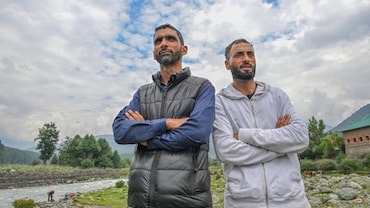The Aftermath Of An Unending Night
Two students escaped campus violence in Jamia, after being saved by some good people they met by chance
 Illustration By Siddhant Jumde
Illustration By Siddhant Jumde
December 2019 is etched in the minds of students across the country. India was erupting in spontaneous protests, against the newly constituted Citizenship Amendment Act, with young students and women often leading the charge. Assam, my home state, was under curfew and internet clampdown due to the raging protests too. A group of us—students from the Northeast—had gathered at Delhi’s Jantar Mantar on the morning of 15 December, with an appeal for peace.
I completed my Masters from Jamia Millia Islamia in 2015, following which I enrolled in JNU. Yet, Jamia still feels as welcoming. This is perhaps because most of us who were M.A. batchmates remained in touch—a small but closely woven network of friends. On what was to be Jamia’s unending night, I decided to visit some of them along with Sakshi*, a friend from JNU, sometime after 4pm.
The cab dropped us off at the Sarai Jullena red light. We could see clouds of black smoke billowing in the sky—the road leading to the Jamia campus was strewn with locals and students. It was past 5 p.m. now. My friend and I held hands and started walking towards Gate No. 7. We met our friends there and found out that one of them was injured in a stampede following the police lathicharge less than an hour before we got there. Before we could talk further, the guards at the gate, who are otherwise very stringent about checking the IDs of students, called out to those on the road and insisted that we enter the campus. Police, we were told, was approaching the campus. We hurried in and the guards locked the gate. I remember feeling a surge of relief, because on this ill-starred day I had forgotten my wallet behind and therefore lacked an identification card. Meanwhile, my friend from Jamia, Asif* introduced us to some of his friends, among them was a guy with long flowy locks which gave him a certain John Lennon air. He seemed to be rushing and we lost him to the crowd soon.
We stood for a while looking at the gathering crowds through the green iron railings which separated the campus from the road, then I took Sakshi to the Central Canteen for tea. We walked past walls with fresh graffiti against what was then, still called CAB. Grabbing two cups of kulhad chai we sat at the back of the bustling canteen. It was exam season and many students were discussing post-paper blues.
As we were sitting, sipping tea, a sudden commotion ensued on the narrow road behind the canteen, that divides the central campus from Jamia’s Stadium. With only an iron railing separating the two spaces, we could see people on the road running away from what appeared to be a marching force. We could hear explosions—these sounded no different than low-intensity bomb explosions episodic in the Assam of the 90s. As we were trying to make sense of the mayhem around, we heard a loud blast—this one seemed much closer. We dropped our clay cups in a heap and dashed out of the canteen. A tear gas shell had gone off right next to the canteen. Everyone around was trying to run away from it, coughing and trying to cover their faces. Asif found us in this melee and with him, the three of us hurried towards the Central Library.
We found a huge assembly of people around the library—the explosions were getting louder and more frequent by the minute now, this meant that the police was drawing closer too. Until it happened, we had believed that a library would never be attacked. Those running back from the direction of the police kept yelling “Police bohat maar rahi hai sab ko” (The police is beating everyone mercilessly). The sound of the shells, by now, was deafening.
I turned to Asif, “Get us out of here, please.” All exits were blocked—we started making distress calls. A tear gas shell landed at our feet this time. I stepped over it and within a few seconds I was choking, gasping for air. Every part of my skin exposed to the chemical-laced air felt ablaze. Everything was a blur now.
After about an hour I was at Naaz and Amera’s flat in Johri Farm, a residential area close to Jamia. My head hadn’t stopped spinning. They offered us salt for the burning skin as we were over our phones, trying to tell friends and family that we were safe, for now. Word had gotten out—there had been police brutality on the students of Jamia Millia Islamia. News of injuries and incidents flooded our phones till we lost count.
On recollection our escape had felt like a never ending run, but it had only been a matter of about 20 minutes. After being tear-gassed, we had rushed towards the narrow exit gate ahead of the library and next to the Jama Masjid. We had pleaded with the guards to let us out. Around four men formed a chain around us and we entered the premises of the mosque which was partially vandalised by police later that evening. We crossed over to the school next to it and entered one of the narrow back lanes of Batla House.
Batla House is reasonably wary of police advances. The air felt heavy and eerily quiet. As we moved in frantic steps towards Tikona Park, several voices called out to us from the dimly lit lanes, “Kahaan jaa rahey ho? Bahar police sab ko maar rahi hai.”“In ladkiyon ko aap log kahaan le jaa rahey ho?” Our male friends would occasionally answer, letting them know that this hurriedly moving group comprised of students looking for refuge. And that the university was being ransacked.
Police had closed all entry points and metro stations in the area. From Batla House we crossed some tense but bustling roads, a graveyard and reached the other end of Tikona Park. Our male friends left us there to attend to the injured in Al-Shifa Hospital. Then Naaz spoke, “We have a place if you want to stay the night, two of us (Amera being the other) live in Johri Farm.” I looked at Sakshi and saw her nodding too. “We would be so glad if you let us stay the night. There doesn’t seem to be a way to get out of the area tonight.” Some of the women dispersed and five of us, Amera, Naaz, Gul, Sakshi and I took an e-rickshaw and reached the apartment. Things were calmer there.
Looking back, we were fed and sheltered by strangers on a gruesome night. The kindness of these women helped me heal through the trauma of having witnessed the brutality which the Delhi Police afflicted on students. As videos of that night surfaced, we knew we were the luckier ones. The guy with the John Lennon hair ended up with multiple stitches, as policemen hit him with chairs in the raid of the library. The nearby hospitals were swamped with bloodied bodies of students.
The early morning Azan next day felt unusually reassuring. My friend and I lay motionless on a bed in the apartment. After a while I called out to her, “Can we stop pretending that we are asleep?” She chuckled, dryly. “Let’s leave at first light.” We went back to staring at the ceiling till it was no longer dark outside.We then thanked Naaz and Amera, promised to meet them soon, and left. We remain in touch till date.
On our way to the metro station we saw the campus street strewn with wreckage. Subh-e-benoor, like Jalib had said. Some professors and local residents seemed to be assessing the damage, talking to the Jamia guards. My friend and I tried to speak to each other, to find expression for voicing what this morning felt like, but words were failing us. The rickshaw driver dropped us off at Sukhdev Vihar and to our astonishment said, “Apunaluk dujon axomor neki?” (Are you both from Assam?). He was *Mustafa Amin and hailed from Kokrajhar, Assam. Mustafa gave us his number and told us that there were around 50 families from Assam who lived nearby. “All our homes are open for you and should anything like this ever happen again, you must come to us.” May nothing like this ever happen again, I said to Mustafa. But he still calls often to check, as an aftermath.






